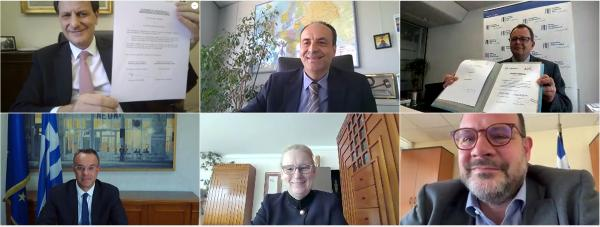
- First agreement of its type between EU bank and member state signed today by Greek Alternate Finance Minister and EIB Vice President in presence of Finance Minister
- EIB to help identify high-impact investment plans
- Emphasis to be placed on climate action, energy transition and digital transformation
The European Investment Bank today formally agreed to help manage up to EUR 5 billion as part of Greece’s implementation of the National Recovery and Resilience Plan, known as “Greece 2.0”.
EIB technical, financial and environmental experts will identify high-impact projects, priority sectors and effective financial structures to ensure best use of new European grant and loan support for Greece to mitigate the social and economic impact of the coronavirus pandemic.
The new cooperation signed earlier today by Alternate Finance Minister Thodoros Skylakakis and EIB Vice President Christian Kettel Thomsen in the presence of Finance Minister Christos Staikouras represents the first time that the European Investment Bank has agreed to assist implementation of the Recovery and Resilience Facility anywhere in Europe.
“The Greek Government has already worked hard to seize the unique opportunity offered by the Recovery and Resilience Facility (RRF), in order to achieve a strong, sustainable and inclusive recovery and growth for Greece. We have prepared a realistically ambitious, modern, innovative and extroverted National Recovery and Resilience Plan, underpinned by structural reforms, efficient public investment and important private sector participation. The key-agreement signed today, between the Ministry of Finance and the European Investment Bank, will give a substantial extra boost to the realisation of projects under our National Recovery and Resilience Plan, ‘Greece 2.0’. Through this agreement, our country will benefit from the EIB’s technical, economic and financial expertise in identifying high-impact projects and effective structures, which will significantly contribute to making the best use of the RRF funds. Furthermore, the EU bank may offer financing, alongside the RRF resources, for some of the projects that will be examined and appraised by its experts. Thus, the European Investment Bank reconfirms today, in the best possible way, that it is an invaluable partner in our effort to respond to the health, social and economic challenges of our time, while forming a solid base to systematically increase the disposable income, to close the investment gap and to create many new, high quality jobs in Greece,” said Christos Staikouras, Finance Minister of the Hellenic Republic and Governor of the European Investment Bank.
“This cooperation with the EIB within the framework of the EU Recovery and Resiliance Facility – the bank’s first such agreement with an EU member state – underlines the maturity of the planning behind the National Recovery and Resilience Plan. Our aim is to avoid wasting a single day in implementing large private investments, which will be financed by the Recovery Fund’s loan facility. The government’s commitment to bridging the investment gap and to creating 200,000 full-time jobs requires cooperation with trustworthy partners, such as the EIB, which will contribute to this effort through its reliability, its extensive know-how and potentially very important additional financing,” said Alternate Finance Minister Thodoros Skylakakis.
“Today’s agreement represents the first formal cooperation between the EIB and a national partner to ensure the Recovery and Resilience Facility delivers on its promise of a better future. It will ensure that recovery from the challenges of COVID-19 also delivers climate action, harnesses digital opportunities and accelerates the energy transition. Over the last 58 years the European Investment Bank has supported investment in Greece to unlock economic opportunities, transform services and support climate action. The EU Bank now stands ready to support the country’s ambitious plans to harness opportunities provided by the Recovery and Resilience Facility funds,” said Christian Kettel Thomsen, European Investment Bank Vice President responsible for lending operations in Greece.
Using global best practice to invest the Recovery and Resilience Facility
Greece is expected to receive around EUR 31 billion from the European Recovery and Resilience Facility, in the form of grants and loans. This is a one-off initiative intended to help repair the immediate economic and social damage brought about by the coronavirus pandemic.
Today’s agreement will enable the European Investment Bank’s dedicated Investment Team for Greece to work with Greek authorities to make best use of the European Recovery and Resilience Facility to identify potential public sector projects, corporate investment, SME financing schemes and targeted advisory initiatives.
This is the first EIB cooperation to implement investment backed by the Recovery and Resilience Facility agreed anywhere in Europe.
Priority green and digital investment to benefit from EIB expertise
The key focus of new investment will support climate action, green energy transition and digital transformation, alongside other sectors that reflect social and economic priorities in Greece.
The new cooperation will initially focus on identifying and proposing new high-impact investment projects located across the country using an estimated EUR 5 billion of investment from the National Recovery and Resilience Facility.
Projects will be examined and appraised by EIB experts, and may also benefit from EIB financing alongside European Recovery and Resilience Facility resources.
Building on record EIB Group engagement in Greece
Last year the European Investment Bank and European Investment Fund provided a record EUR 2.8 billion of new support for high-impact private and public investment in Greece.